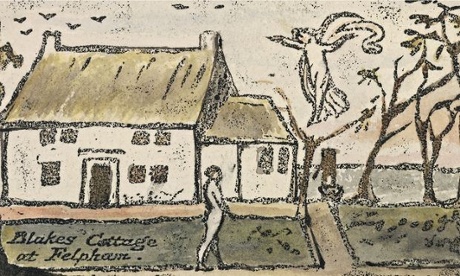Crowdfunding campaign hopes to save William Blake’s cottage for nation
Fundraisers looking to raise £520,000 to buy the house where, he wrote, ‘Heaven opens here on all sides her golden Gates’

A campaign to crowdfund the £520,000 needed to buy the cottage on the Sussex coast where William Blake hymned ‘England’s green and pleasant land’ is due to launch next week.
Blake lived in the thatched cottage in Felpham, West Sussex, between 1800 and 1803, composing much of his epic poem Milton, and the poem which became the much-love hymn Jerusalem, beneath its “thatched roof of rusted gold” – and according to literary legend reading Paradise Lost to his wife Catherine while the pair sat naked in the garden. The propertycame on to the market last year for the first time since 1928, for an asking price of £650,000; the Blake Society has since negotiated a purchase price of £520,000, which it has until the 31 October to raise. There is too little time to seek the money from more traditional funding organisations, so it is turning to the public.
Intending to turn the cottage into a place which celebrates Blake, “welcomes visitors, poets, artists and scholars to continue his legacy”, and is “an exemplar of a way to live a life through courage and creativity”, the Blake Society’s campaign is backed by literary fans of the author from Philip Pullman to Stephen Fry, Alan Moore and Russell Brand.
“Since Jerusalem is sung up and down the country and known by millions, we would like to invite everyone each to give a small amount through crowdfunding, then the cottage will belong to everyone for the benefit of the nation – and the only nation is the imagination,” says the organisation. “We are inviting support from everyone who is strengthened by the knowledge that somewhere in the world such a place exists; a home for the dissenting imagination in England’s Green and Pleasant Land.”
The crowd-funding campaign will launch on 19 September. “We’re confident we will raise it … We thought if we could raise the money by asking a lot of people to give a very little, it would give us an independence. Blake is a difficult character, who tends to bite the hand that feeds him, so it’s better to have this independence. That’s why we are going down that route,” said chair of the society Tim Heath.
Once the cottage is purchased, the society intends that it will be put into a charitable trust to be held in perpetuity for the benefit of the nation.
“In his lifetime Blake lived in nine houses. Only two survive. The other house is in London, and people are always welcome there to talk about Blake, but it’s not a museum and has a very small capacity. The idea is to link these two remaining houses where Blake lived,” said Heath. “Literary houses can have a detached connection to their author, but for Blake place was so important that it seems extraordinary that in Britain we don’t celebrate these two extraordinary houses.”
Blake wrote to his friend John Flaxman on his arrival in the cottage that “Felpham is a sweet place for Study because it is more Spiritual than London … Heaven opens here on all sides her golden Gates”, also singing its praises in poetry: “Away to sweet Felpham, for Heaven is there / The ladder of Angels descends through the air.”
But his time in the cottage also saw Blake arrested and tried, according to a report of the time, for “having uttered seditious and treasonable expressions, such as “D—n the King, d—n all his subjects, d—n his soldiers, they are all slaves”, after a soldier broke into his garden and the poet threw him out. Blake was acquitted.
“There’s that expression – no one is a prophet in their own land. Blake’s position in English culture is very strange. Jerusalem is almost an alternative national anthem … yet there in that cottage he was arrested and accused of sedition,” said Heath.
Awareness of the legacy Blake left behind is also set to be raised with a new festival celebrating the poet and painter as “father of the imagination”. Featuring a mix of psychologists, economists, poets and artists “to try and show off the breadth of areas his genius touched”, said Rachel Searle, founder of the Big Blake Project which is running the festival, the celebration starts on 16 September with events at St Mary’s Church in Felpham from Blake scholars, and continues on 20 September with plays, performances, music, poetry and art in the Old Rectory Gardens in Felpham.
“The festival has been set up to raise awareness of the shared campaign to buy Blake’s cottage and to launch the crowdfunding side,” said Searle. “A lot of the artists and contributors have offered their time at short notice because they are keen to help secure the cottage for the nation. It is also important for the local area since it gives us a bit of a claim to fame as the birth-place of Jerusalem, a piece of Blake’s [poetry] that is well loved. Blake himself tended to sing his poetry – it is quite a thrilling thought to imagine him singing as he walked on along the ‘banks of the ocean’”.
沒有留言:
張貼留言